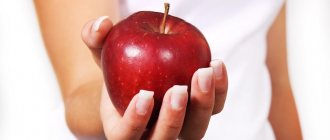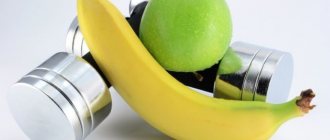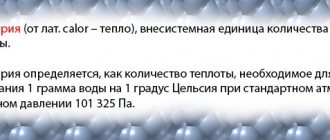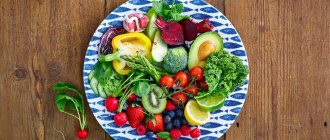Cardio exercises are becoming more and more popular every year.
This is due to the fact that modern people do not have enough physical activity necessary for the normal functioning of the body.
This type of exercise includes fast walking, dancing, and various types of aerobic training.
Cardio not only helps strengthen blood vessels and improve health, but also burns excess calories.
An integral part of physical activity is adherence to certain nutritional rules during cardio training for weight loss, which will be discussed in detail in the article.
General rules
Cardio training helps you lose weight because the body uses a large amount of energy during it. After 30 minutes of intense exercise, stress hormones are produced, which help burn fat even better. However, even a properly designed training plan will not bring the desired result in the fight against excess weight without diet correction. Those losing weight need to follow several rules regarding the organization of their diet:
- Do not skip breakfast during high-intensity exercise. Ignoring this advice may result in the body not having enough energy to complete tasks. It is recommended to consume food 2 hours before training.
- Drink at least 3 liters of clean water per day. Otherwise, decay products and waste will accumulate in the muscles due to insufficient leaching.
- After each workout, have a light snack consisting of low-fat foods. Preference should be given to proteins.
- Completely avoid sweets and confectionery. In rare cases, you can afford a cube of dark chocolate.
You should know! To keep your figure in shape, you need to follow a diet regularly. It should become a way of life, not a short-term change in diet.
What can you eat
During cardio training aimed at losing weight, you are allowed to eat:
- soups cooked in vegetable broth;
- dietary meats (turkey, rabbit, beef);
- sea and river fish, crustaceans;
- fermented milk products and low-fat milk;
- fresh fruits and vegetables;
- bran;
- cheeses (fat content no more than 30%);
- flax and sesame seeds;
- nuts (up to 50 g per day);
- legumes;
- bread without yeast;
- whole grain cereals;
- egg whites.
Among the drinks allowed for consumption are green tea, rosehip decoction and herbal tinctures of water.
What to exclude
To replenish lost energy after cardio training, it is recommended to use complex carbohydrates and proteins. If the warm-up is aimed at weight correction, then the following must be excluded from the diet:
- fast food containing many empty calories;
- sweets;
- flour products;
- chocolate bars.
How to choose the right products
Food during cardio training is chosen depending on what type of exercise was emphasized. During high-intensity exercise, which is performed before bedtime, they eat carbohydrates and protein compounds.
This combination of organic substances provides the necessary energy during exercise and material for building muscle cells. It is advisable to eat food 2 hours before exercise.
The best food combinations for high-intensity cardio training:
- buckwheat + turkey;
- rice + fish;
- pasta + beef.
In addition to the listed ingredients, you can introduce any types of vegetables. Let's have a snack with foods containing simple organic compounds (chocolate, sugar, honey).
When, how and how much
Low-intensity exercise does not require the consumption of simple carbohydrates. This type of exercise can be carried out at any time of the day (morning, afternoon and evening), subject to certain rules:
- If the loads are carried out in the morning, then it is better not to eat anything before them. This time of day is considered the best for weight loss, since against the background of low glucose levels in the body, fats will be burned more efficiently. After morning exercise, protein-rich foods (chicken, fish or proteins) are recommended.
- Before daytime cardio training, have lunch 1.5-2 hours before. The best snack is food containing complex carbohydrates (fruits, cereals). After classes, nutritionists advise re-concentrating on vegetables and proteins.
- If the workout is performed in the evening, then do not eat 2 hours before. Vegetables and meat are suitable for a snack. After classes, you need to drink water and stop eating.
Important! During cardio training, increased burning of muscle mass occurs, which is replenished from subcutaneous fat deposits. Due to this action, the weight loss effect is achieved.
Attention! The opinion that after cardio exercises you cannot eat for 2 hours is incorrect; in this case, along with fat deposits, muscle mass is also burned, which is necessary to create a sculpted body.
Be sure to check out:
Simple recommendations from famous trainers on what to eat before a workout to lose weight What to eat before a workout: recommendations from experts What is the best thing to eat after strength training and cardio to burn fat What and how long can you eat after a workout
Authorized Products
The diet for cardio training for weight loss includes:
- Soups with vegetable broth.
- Different types of dietary meat (beef, chicken, rabbit and turkey), cooked boiled or baked.
- Any sea/river lean fish, seafood (squid, mussels, crabs, shrimp). and others.
- Various, mostly whole grain cereals - oatmeal, brown rice, buckwheat, wheat, cooked in water with a minimum of salt.
- Legumes (lentils, peas, chickpeas, beans).
- Chicken egg whites in the form of an omelet or boiled.
- Yeast-free bread with bran/grain.
- A wide range of vegetables/fruits, bran, sesame and flax seeds as an additional source of fiber.
- Low-fat dairy/fermented milk products, low-fat cottage cheese.
- Cheeses with a fat content of no more than 20-30%; Salads can be dressed with yogurt.
- Various types of nuts (30-50 g per day).
- First-press vegetable oils (olive, sesame or flaxseed) for dressing salads.
- Green tea with added fructose, rosehip decoction, coffee, herbal teas, purified water up to 2.5 liters. Freshly prepared juices.
Food before exercise
Before cardio training, it is important to saturate the body with amino acids, which will promote fat burning. The substance is obtained from food or special medicines.
The main meal is taken 2 hours before classes, provided that they last no more than 30 minutes. Also, before this, it is necessary to include complex carbohydrates in the diet, which will maintain the body’s energy reserves at the required level.
Important! During training, you need to drink liquid in small sips to regulate your water-salt balance.
Main conclusions
Before you start cardio training, you need to decide on your ultimate goal.
When correcting weight, it is necessary to avoid consuming fast carbohydrates (sweets, baked goods, chocolate) before and after training. Light organic compounds are allowed to be consumed only during high-intensity exercise. Nutritionists do not recommend intensive training on an empty stomach, as it can negatively affect your well-being and health. “Hungry cardio” is only permissible during low-intensity exercise (during yoga or walking). Read more about this in the articles:
When working with weights, it is recommended to increase the daily dose of proteins and carbohydrates eaten to 1-2 g/kg and 4-6 g/kg, respectively.
Sources:
https://sportyfi.ru/fitnes/kardiotrenirovki/chto-est-posle/ https://medside.ru/dieta-pri-kardiotrenirovkah-pitanie-dlya-pohudeniya https://gercules.fit/pitanie/sportivnoe-pitanie /eda-i-trenirovki/pitanie-pri-kardiotrenirovkah-dlya-pohudeniya.html
Advice from professionals
According to nutritionist Anna Ivashkevich , many athletes actively promote “fasted cardio exercises,” that is, morning exercises on an empty stomach. From a medical point of view, such training is considered dangerous to health, as it provokes spikes in blood sugar and the reflux of bile into the stomach. On an empty stomach, you can only engage in calm sports - yoga, walking, stretching.
There are several breakfast options that will not affect your figure and will give a boost of vivacity and energy to the body during exercise: unsweetened porridge with low-fat milk or water with the addition of berries, low-fat cottage cheese with sour cream and fruit, pancakes with cottage cheese made from cereal flour.
Bodybuilding trainer Irina Semenovich believes that nutrition during cardio training aimed at burning fat and reducing body fat should be different. In the first and second cases, it is important to consume protein, complex carbohydrates and fiber contained in fruits and vegetables, however, when gaining muscle mass, the amount of protein and carbohydrates consumed should be increased to 1-2 and 4-6 g per 1 kg of weight, respectively.
According to the trainer, reserves of organic compounds must be replenished both before and after training. Chicken or fish with vegetables, cereals, egg dishes, low-fat and lightly salted cheeses are allowed as a snack.
Nutrition after cardio training
With intense training, the body begins to actively burn fat. After their completion, the body continues the process of splitting for some time, so it is not recommended to eat immediately after the end of the exercise. The optimal time after which you can eat is considered to be 20-30 minutes after the end of the program. At the end of the program, it is necessary to consume fast proteins, which will help strengthen muscles and reduce the risk of muscle metabolism (muscle breakdown).
Fast proteins include: egg white, lean meat (chicken, beef, veal), whey protein). 45 minutes after physical activity, consume a slow carbohydrate (legumes, cereals, whole grain pasta, fruits, berries, vegetables), it will help you stay full longer and fill the body with energy.
What are the advantages and features of cardio for weight loss as opposed to other types of physical activity?
The benefits and effectiveness of cardio exercises per day for the general strengthening of the human body and the development of physical fitness are noticeable for both beginners and professional athletes. It often happens at the gym when a queue forms near the treadmills.
But, according to experts, too much cardio can cause not only benefits, but also harm to the body. What do you need to consider when training to burn fat? How to exercise on exercise machines with maximum benefit?
Cardio exercise is beneficial if you regularly monitor your heart rate, otherwise you will simply harm your body.
Rules for taking protein for weight loss
Contrary to misconceptions, protein mixtures are relevant not only among those who build muscle mass. It is used to make excess weight a thing of the past. But how to drink protein correctly for weight loss, before or after training, in the morning, at lunch or in the evening. It wouldn’t hurt to look into this issue a little more thoroughly.
Best time for a cocktail
To organize a high-quality process of losing excess fat, you need to pay attention to nutrition. Between meals throughout the day, you can use protein as a fuel or snack. If the amount of protein turns out to be insufficient, then with dietary restrictions, as well as intense training, the muscles may simply begin to break down. Then your entire weight loss process will be considered ineffective, and as a result you will get a flabby body with minimal strength and endurance.
- Replace an additional 2-3 meals with shakes. That is, leave the main lunch, breakfast and dinner, and insert snacks between them. For example, at 12:00 you can organize a kind of lunch, and at 17:00 - an afternoon snack.
- Please note that in between snacks the protein portions should be “half” (15 grams, instead of 30).
- It is good to take a protein shake from an industrial mixture two hours before the start of physical education, as well as the same amount of time after them.
- Protein consumption at night is not recommended. Although, in the course of research, researchers at the University of Maastricht came to the conclusion that novice security forces gain muscle mass more quickly if they have dinner with just such a cocktail in the evening.
However, if you have problems with excess fat, experiments such as in the last paragraph are not recommended, so as not to aggravate the problem.
Rules for effective cardio
- Cardio training lasting 1 hour should take place 3-5 times a week.
- Depending on the choice of aerobic activity (cycling, running, swimming, jumping rope), be guided by your well-being and preferences.
- Do interval training 2 times a week.
- The sports program should include 2-3 strength training sessions.
- During exercise, maintain your heart rate at 65-70% of the upper limit.
- To prevent the weight from returning, do cardio at least 3-4 times a week.
- Combine exercises for the development of the cardiac system and weight loss. Moreover, in the first case, the training intensity should be at maximum (up to 85% of the upper heart rate limit), and the duration of the session should be no more than 20 minutes. In the second case, choose a moderate rhythm with a load of no more than 65% of the maximum heart rate.
What is cardio exercise from a physiological point of view?
From the name it is clear that cardio training is primarily aimed at strengthening the cardiac and vascular systems of the body, as well as the heart muscle. The heart is the main muscle in the body. Like other muscles, it needs training to maintain its strength. If the exercises last 5 minutes or longer, with moderate intensity, then the breakdown of glucose (the main energy) will be carried out with the participation of oxygen. This is why cardio is an aerobic form of exercise.
When the glucose supply runs out, energy is drawn from adipose tissue, which is the body's long-term reserve. The benefits of cardio will be greatest with regular aerobic exercise. Only in this case does the heart’s ability to enrich the blood with oxygen and deliver it to the muscles increase; metabolism accelerates; thermoregulatory properties are improved; Blood pressure decreases, and with it the risk of developing cardiovascular diseases. The body perceives periodic exercise as stress and reacts to it with increased blood pressure and increased fatigue.
Aerobic exercises for the breakdown of fat are a long-term combination of repetitive movements, during which the heart rate increases significantly. A prerequisite for successful cardio is outdoor exercise. Ventilate the room before training, or even better, exercise near an open window or outside.











